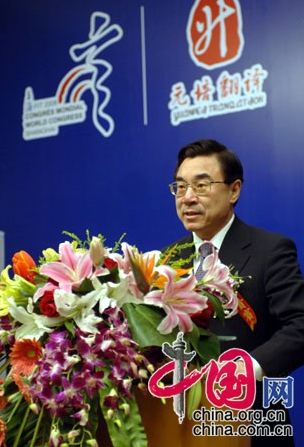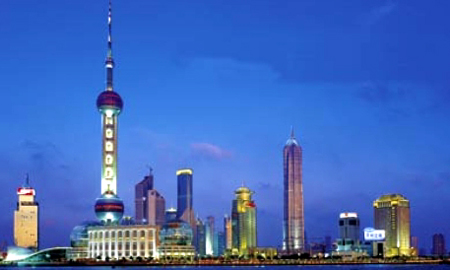|

Huang Youyi delivers a speech at a press conference for the 18th World Congress of the International Federation of Translators (FIT) in Beijing, Feb. 27, 2008.
|
By Huang Youyi
The author is a member of the National Committee of the CPPCC, Vice President of China International Publishing Group, Vice Chairman and Secretary-general of the TAC, and Vice Chairman of the FIT.
With globalization developing apace, translation services around the world are now more vital than ever. Accurate translations are crucial in facilitating effective communication, cultural exchanges, and understanding between nations and cultures.
On the eve of the 2008 Beijing Olympics in August, the 18th World Congress of the International Federation of Translators (FIT) will take place in China's most international city, Shanghai. The triennial event promises to be a grand festive gathering for language and cultural exchange professionals from around the world.
Celebrating and preserving humankind's linguistic heritage
The Translators Association of China (TAC) joined the FIT in 1987. Although not long in the FIT family, China won the honor of hosting the 18th World Congress, and two Chinese translators have been elected members of the FIT's 17-seat council. One of this pair became the organization's vice president -- the first time in the FIT's history a Chinese person has held this post.
"China's unanimously-approved selection as the host country for the 18th World Congress of the FIT is a mark not only of China's great significance to the organization, but also China's importance in the progress of translation services worldwide," commented FIT President Peter Krawutschke in his congratulatory speech.

Reflecting the attention being given to cultural diversity globally, the theme of the FIT's 18th World Congress is "Translation and Cultural Diversity." The theme also highlights the significant role translation work plays in maintaining a diversified cultural spectrum.
Presently, approximately 6,800 languages are still alive worldwide; of these around one-third have written forms. In the world's most populous country of China, there are 73 languages in use. The most extensively employed, Mandarin or putonghua, has seven major dialects and over 100 sub-forms. The world's multiplicity of languages is a key part of humankinds' cultural heritage, and translators play a vital role in preserving this brilliant mosaic of diversity.
The 18th World Congress of the FIT is set to be unprecedented in terms of form, size and content. Over 1,000 representatives from more than 70 countries are expected to attend, with speeches from UN and EU leaders, and distinguished Chinese and foreign scholars. During the four-day meeting, around 100 seminars will cover a wide range of subjects, including culture, education, economics, foreign diplomacy, trade administration and contemporary science and technology. There will also be a large exhibition on the progress of translation services internationally.
Chinese translation work: a mirror of reform and opening up
The harmonious coexistence of different nations owes much to translation work, which at its best is able to remove linguistic barriers and facilitate communication between societies, cultures, regions and countries. The result of successful communication is inspiring, allowing new thoughts, wisdom and perspectives to seep into society.
Previously, China has experienced three main upsurges in its translation history: the surge of Buddhist sutra translation that began during the Eastern Han Dynasty (25-220) and continued through the Tang and Song dynasties (AD 618-1279), the sci-tech document translation work that took place in the early 17th century during the late Ming and early Qing dynasties, and the translation of Western Studies between the Opium War and the May 4 Movement (1840-1919). All three periods have one thing in common: these translations played a leading role in the cultural and ideological progress of their respective eras.
Since the introduction of China's reform and opening-up policies 30 years ago, translation in China has experienced a fourth upsurge, unmatched in its scale, quality or contribution to the country. Translation is no longer simply an instrument for conducting foreign affairs, or the preserve of literature and theoretical studies. It has also played a central role in the political, economic, cultural, scientific, technological and military domains. Translations provide a bridge in every sense for exchanges between China and the rest of the world.